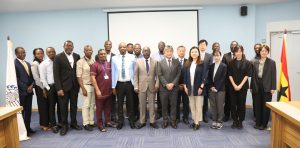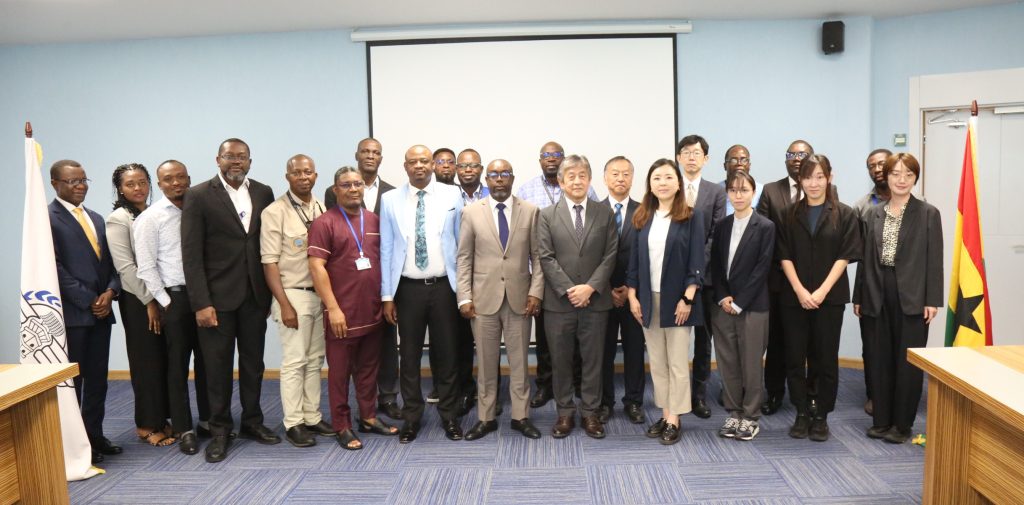JRANSA & Pacific Consultants Meet GCAA to Collect Aviation Data for JICA’s future cooperation policies

A seven-member joint team from the Japan Radio Air Navigation Systems Association (JRANSA) and Pacific Consultants Company Limited met with the management of the Ghana Civil Aviation Authority (GCAA) on Monday, 18 August 2025, as part of a data collection survey on transport networks in Africa and air traffic control in the Africa region for the Japan International Cooperation Agency’s (JICA) future cooperation policies.
The survey team, which met GCAA managers at the Kotoka International Airport headquarters in Accra, has been tasked with identifying the development needs of airports and air traffic controllers in the region and reviewing them for JICA’s future cooperation policies.
The survey covers civil aviation regulations, air traffic services, airport operations, security, aviation safety, and demand forecasting.
It aims to address two main challenges: airport infrastructure development and improvement of aviation safety.
Airport Development Focus
For airports, the survey will examine the history of development and maintenance, future implementation and renovation plans, the status of flight cancellations and delays, as well as issues concerning runways, taxiways, apron layout and scale, transportation access, terminal facilities, and introduced equipment.
It will also assess compliance with USOAP directives, the current condition of ageing airport facilities, and challenges in maintenance and management.
Other aspects include organisational and personnel systems, development of airport operation and maintenance manuals, terminal congestion, and the allocation of firefighting and rescue facilities.
Air Traffic Services Focus
With regard to air traffic services, the survey will review AIPs (airspace, arrival/departure procedures, flight routes, airport overviews, ANS systems, and ATC systems operation status).
It will extract issues related to air traffic control from aeronautical safety information, USOAP directives, and air traffic controller license management.
Additional considerations include NOTAMs, system malfunctions, directives from international inspections, the need for additional ANS & ATC system functions, and the ageing of ANS & ATC systems.
The study will also evaluate air traffic control capacity performance, including the number of air traffic controllers, training systems, ATC capacity calculation methods, airspace structure, and the availability of CNS engineers.
The team will further gather data on existing plans for new constructions (relocation), renovation, or expansion of ANS & ATC systems, as well as challenges concerning air traffic control services.
Next Steps
Following the data collection process, the team will hold consultations on airport infrastructure development needs in line with national policies.
This will involve identifying challenges through the data and interviews, considering countermeasures, and examining future cooperation policies.
At the meeting, the management of GCAA, led by Acting Deputy Director-General Theophilus Ago, who sat in for Acting Director-General Stephen Wilfred Arthur, competently provided the survey team with all the necessary information required.
They took the Japanese delegation through the technical operations of the Authority, highlighting its efficiencies and also pointing to areas where opportunities exist for future cooperation between the GCAA and JICA, particularly in logistics through capital investment.
On day 2 of their visit, the Japanese delegation toured some facilities of the GCAA to gain a better understanding of the Authority’s operations.

About The Author
You may also like
-
GCAA Ends 3-Day Corporate Strategy Review Meeting To Plan Ahead
-
President John Mahama Commissions GCAA’s New Aviation Navigation Centre and Border Security Systems
-
GCAA Wins UG Corporate Football League
-
MR. THEOPHILUS ADONIS ARYEE AGO APPOINTED AG. DEPUTY DIRECTOR-GENERAL (TECHNICAL) OF GCAA
-
MINISTER OF TRANSPORT INAUGURATES NEW GOVERNING BOARD FOR GCAA
